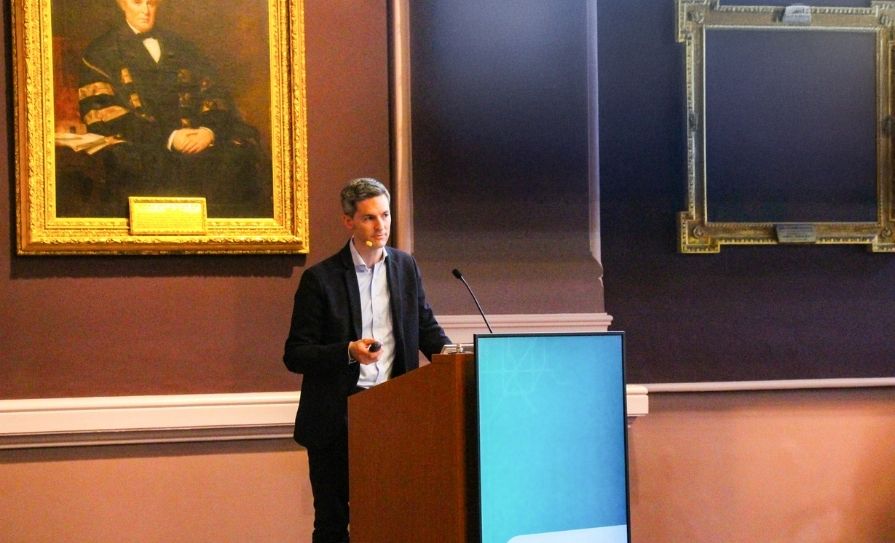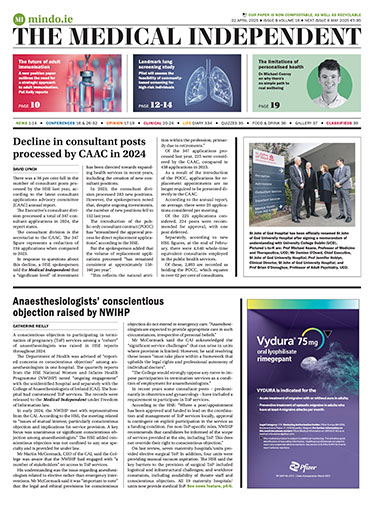Quality issues surrounding the intern year were raised during an external review process. Catherine Reilly reports
Concerns were raised by various stakeholders about resourcing levels to support the learning requirements of interns, according to a review commissioned by HSE National Doctors Training and Planning (NDTP) and conducted by Crowe.
Resourcing was also discussed at a meeting of the Medical Intern Unit’s (MIU) management committee in February, show minutes seen by the Medical Independent (MI).
“Members welcomed [the] overall increase in funding for the provision of the intern training, however, they expressed concerns that the funding may not recognise the difference between the employment costs and education and training…,” stated the minutes.
“They advised that the funding support towards education and training is insufficient, that very often [Intern Training] Networks rely on financial support from their schools and goodwill of the tutors/lecturers who provide the training to interns.”
Members referenced a funding proposal submitted to NDTP for consideration. According to the minutes, an NDTP representative commented that any additional funding was secured via the HSE’s estimates process and was difficult to obtain without the provision for an increase in service delivery.
Crowe review
As well as resourcing issues, the Crowe review noted concerns about the extent of service provision versus training in the intern year, and a lack of uniformity and standardisation for intern training nationally.
The consultation exercise was undertaken as part of a broader review of intern numbers. Stakeholders were asked about intern numbers and the overall intern experience. The consultation was not intended as a definitive evaluation of opinion, but this did not “dilute or negate” the value of the themes raised. The review advised that further examination of these issues was “highly recommended”.
The participating stakeholders included a representative from the Intern Network Executive, Medical Intern Board (MIB), MIU, Forum of Irish Postgraduate Medical Training Bodies, and an NCHD, as well as three representatives from the Medical Council and two from the Irish Medical Schools Council (IMSC). A “small” number of the contributors stated they were not directly involved with interns and their comments were based on anecdotal or indirect evidence, noted the review.
A copy of the review, and minutes of the MIU management committee meetings, were obtained following a Freedom of Information request to the HSE.
Reform
There is significant ongoing reform of the intern year. A core aim of stakeholders is to implement a centralised approach to ensure a comparable intern experience across the six intern networks.
The HSE, Medical Council, medical schools and associated intern networks, all have pivotal roles in the delivery of intern year.
The medical schools are contractually obliged to develop and provide the intern training programme under service level agreements with the HSE. Training is delivered via six intern networks that involve over 50 clinical sites nationally.
The Medical Council has statutory responsibility to quality assure intern training. In 2017, due to the “fragmented” governance system, the HSE and Medical Council established the multi-stakeholder MIB. It sets the strategic direction of the intern year. The MIU, created in 2018, oversees and manages operational delivery and implements the recommendations of the MIB.
Currently, a proposal is being developed for a single national body to oversee intern training.
A Medical Council spokesperson told MI: “There is no single national body responsible for intern training in Ireland. Existing intern arrangements have resulted in variation in the quality of the intern training experience.”
In 2021 an external review of the governance system was commissioned by the Medical Council and the subsequent report was accepted by its education and training committee. In March 2022, “Council de- cided to support the recommendation to develop a single national training body to oversee the internship experience.”
The Council has requested the IMSC to develop a model for such a body and the IMSC expects to submit its initial proposal before the end of 2023.
Additionally, the Council has commissioned Cardiff University to undertake a qualitative review of the configuration of intern posts. This is expected to be completed in March.
A competency-based national intern curriculum framework has also been developed under the auspices of the MIB. MI reported in July that the MIB was seeking a suitable technology platform for the piloting phase.
Increased posts
Under legislation, the HSE must annually assess the number of intern posts required by the health service. In 2019, there were 734 posts. In 2020, as part of the response to the Covid-19 pandemic, this figure rose to 995, and then fell to 854 in 2021.
The increases exceeded the recommendations of the Fottrell Report (2006) and prompted the external review to assist with appropriate forward planning.
Having developed a planning tool, the Crowe team projected the number of posts required over the following 12 years to meet estimated demand for consultants and GPs. This projection, contingent on several assumptions, indicated that intern posts should remain at 854 from 2022 to 2024 and gradually rise to 1,000 by 2034. The planning tool would enable the development of a range of scenarios based on changing requirements, stated the review.
As per the terms of reference, the review included information on recent approaches to intern enrolment across five comparator health systems. Of these, only the Irish system created additional intern posts in response to the pandemic. While the review expressed caution around the data, it appeared Ireland had the second lowest beds per interns of the comparator countries in 2019.
It also appeared that if Ireland persisted in the short-term with an intake of 854, it would remain loosely aligned with the numbers of posts in the health systems of Scotland and Australia (albeit forecasting could not be made for the numbers of interns in the comparator countries).
The stakeholder representatives were “broadly in favour” of maintaining the intake at 854. However, this position was “strongly caveated” with the belief that structural change was required to ensure interns received “the necessary levels of training, support, and supervision”.
A common opinion was that the calculation for future intakes must be objective and based on the requirements of the health system.
“In terms of the impact of the increase of interns, many expressed the view that it has served to exacerbate the prevailing difficulties such as time constraints for supervision and training, and has led to redundancy on occasions, such as reduced clinical activity, although this appears to be related to spe- cific medical specialties.”
Some felt there was poor recognition by many hospital consultants of the requirement to provide training support to interns. There were suggestions that a lack of consequences for neglecting these training needs resulted in further pressures on those consultants who provided this support.
There were accounts of larger hospitals using interns as ‘another pair of hands,’ but it was also reported that increased numbers in smaller hospitals had stimulated the learning culture.
Mentorship
Regarding the overall intern experience, many contributors felt there was too much emphasis on service provision.
The review also noted: “The variability of the culture within a clinical team can strongly influence the level of intern experience, with concerns raised about bullying and environments not conducive to learning. Accounts were provided of interns reporting that they do not feel able to ask for help when they need it and being consistently perceived as filling task-based gaps in service provision.”
“However, it should be stated that there is also evidence of good practice expressed, such as weekly lunch meetings for interns.”
Mentorship was brought up on several occasions, with support for the idea of a formal network of mentors. It was suggested that new consultants would also benefit from mentorship to enhance their role as trainers.
The review noted significant improvements to support interns, such as introduction of a paid two-week induction (including the ‘shadowing’ week).
During the consultation, it was also reported that the business model of medical schools relies on tuition fees from non-EU students, which may create pressures on the system as “the numbers from this cohort are not typically aligned to internship and post- graduate training opportunities, due to repatriation intentions”.
In conclusion, the review recommended that the intake remain at 854 for 2022. It advised that ‘phase two’ (qualitative review) should be engaged imminently to build on high levels of stakeholder engagement and inform the estimate for the 2023 intake.
It stated that future calculations must be aligned to evidence-based requirements of the medical workforce and health system.
Other recommendations included consideration of both a mentorship scheme and increased resources for education and training.
Ambition
There were 854 posts available for 2022, and 879 for 2023, which is a 20 per cent increase over the last five years. This is to ensure alignment with training posts, according to the HSE.
A spokesperson said: “The costs associated with the expansion of intern posts to the HSE include salaries, training delivery costs, and financial training scheme supports for interns. An overall funding increase of approximately 40 per cent over the last five years has been provided within the funding envelope to medical schools for delivery of intern training.”
In regard to issues raised about the role of consultants, the spokesperson said further stakeholder engagement is planned as part of piloting the curriculum to ensure “recognition and understanding of the standards and requirements for intern training”.
Prof Brian Kinirons, NDTP Medical Director, told MI all stakeholders want to enhance the intern year, “recognising that not every intern has the same positive experience.”
He also emphasised the importance of filling all intern posts. Last year, approximately 30 posts were unfilled, but the figure was markedly reduced in 2023.
Prof Kinirons highlighted the success of the academic intern track programme, which was established as a pilot in 2017 following a proposal to NDTP by the Intern Network Executive. It gives interns the op- portunity to participate in clinical research, medical education or healthcare leadership and management. The programme, which has been the subject of a positive external evaluation, increased its places from 24 to 48 this year.
IMSC
A response on behalf of the IMSC was provided by Prof Paula O’Leary, Dean and Head of University College Cork’s School of Medicine and outgoing Chair of the IMSC.
Commenting on the development of a new governance model, Prof O’Leary said: “The Heads [of the medical schools] are currently engaged in a comprehensive process to deliver a response to this request and expect to submit the initial proposal to the Medical Council before the end of 2023. Consistent, standardised and high-quality intern training, delivered by suitable personnel, in appropriate clinical learning environments and with remediation and supports in place for the small number of interns experiencing difficulties in training are among the issues under consideration in developing the proposal.”
In regard to the Crowe review, Prof O’Leary noted: “The Crowe report provides some useful intern number modelling. The stakeholder commentary is based on semi-structured interviews with 10 individuals with variable experience of or inputs into intern training. While the comments should not be negated, it is important that the limitations are recognised. The current work underway by School Heads at the re- quest of the Medical Council is intended to provide a proposal to provide a pathway to a well-structured, funded and staffed learning experience for interns within the Irish healthcare system.”
New guide to working as a doctor in Ireland
Working as a Doctor in Ireland is a comprehensive new guide developed by HSE National Doctors Training and Planning (NDTP). It is believed to be the first publication of its type for NCHDs in the Irish health service.
While the guide is principally aimed at NCHDs newly arrived in Ireland, it is relevant to all doctors. The contents span a range of topics, including the structure of the Irish medical workforce, mandatory training courses, immigration processes, and pre- employment screening requirements.
It outlines the education funding supports available for NCHDs and the digital services provided by NDTP, such as the National Employment Record (NER). The NER allows doctors to interact virtually with medical manpower departments through a browser- based portal or its recently launched app.
The interim report of the Department of Health’s NCHD taskforce, published in April, recommended the introduction of an enhanced NCHD induction programme for international medical graduates (IMGs), and the new guide is an element of the HSE’s response in this regard.
Speaking to the Medical Independent, Medical Director of NDTP Prof Brian Kinirons said there were many complexities to commencing work as a doctor and especially in an unfamiliar health system. The guide includes links to several important resources, including the Medical Council’s ethical guide and health and wellness supports.
Extensive feedback on the draft was invited from doctors prior to publication. The guide is a “digital document” which will be updated annually as required. It has been shared with the NDTP’s database of NCHDs and is available on the HSE website.
Enhanced induction programme
The NCHD taskforce stated that “enhanced and protected induction” for IMGs should be initiated as a proof-of-concept programme for July 2023.
In July, several sites introduced a pilot and the ultimate aim is to roll it out nationally. Prof Kinirons, who is also a member of the NCHD taskforce, said he believed the HSE and clinical sites are committed to doing so.
Such a programme would not only relate to the practise of medicine, but the context in which it is practised. It would cover issues around communication, open disclosure, patient safety, and relevant legislation, stated Prof Kinirons.
The taskforce’s interim report also stated that all NCHDs must receive timely specific induction delivered in protected time (four hours) within the first two working days.
Currently, there is inconsistency in the implementation of NCHD induction across sites. However, while certain sites “struggle more than most”, Prof Kinirons said many do deliver timely induction during protected time. The area of induction will be the focus of recommendations in the final report of the NCHD taskforce, which is due to be submitted to the Minister for Health shortly.
Medical Manpower (MMP) is another essential resource required to support NCHDs throughout their career journey.
As the taskforce’s interim report noted, MMP was originally a dedicated NCHD support service when first established in 2002. The report recognised that the current level of MMP supports was variable across sites and it made recommendations to enhance this service.
Prof Kinirons acknowledged there was a deficit in MMP staffing levels. This was particularly notable in the context of “exponential increases” in NCHD numbers. In addition, Prof Kinirons noted that the role of MMP managers had become more complex.
There is an intent to enhance the service, which includes the ongoing development of a tailored training programme for new MMP managers, he added.
Working as a Doctor in Ireland can be accessed here: https://www.hse.ie/eng/staff/leadership-education-development/met/













Leave a Reply
You must be logged in to post a comment.